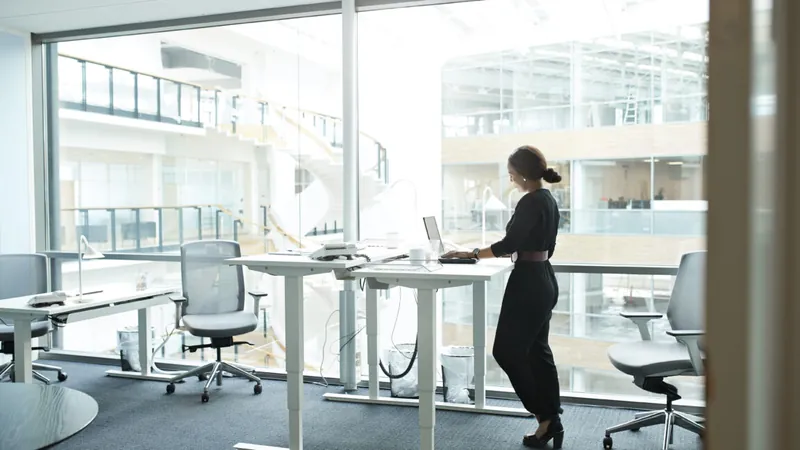
Are Standing Desks the Key to Better Health? Here’s What the Latest Research Reveals!
2024-11-14
Author: Ting
Are Standing Desks the Key to Better Health?
In our modern, sedentary lifestyles, the consequences of prolonged inactivity are becoming increasingly apparent, with studies linking excessive sitting to a higher risk of cardiovascular disease and premature death. The obvious solution seems to be to avoid sitting down altogether; hence the popularity of standing desks has surged. But are these desks the cure-all solution for our health woes? Recent studies provide a more nuanced view of the benefits and potential drawbacks of standing while working.
The Effectiveness of Standing Desks
For years, many believed that standing desks could improve cardiovascular health markers such as lipid levels, insulin sensitivity, and arterial dilation—the vessel's ability to widen with increased blood flow. However, a 2018 analysis suggested that the enhancements could be minimal and insufficient to significantly reduce the risk of serious health issues, like heart attacks. Moreover, it’s essential to recognize that standing, just like sitting, still qualifies as being stationary—meaning it doesn’t inherently solve the problem of inactivity.
Expert Opinions
Two eminent health experts, David Rempel and Niklas Krause, further challenged the effectiveness of simply swapping sitting for standing. They posited that not all sitting is detrimental, highlighting that the risks of prolonged sitting could vary based on where that sitting occurs—such as at home versus in an office.
Recent Research Findings
Despite contradictory evidence, recent studies continue to reveal concerning associations between prolonged sitting and health risks. A recent significant study published in the International Journal of Epidemiology tracked over 83,000 participants in the UK for about seven years. The results were enlightening: while standing desks do not enhance heart health, they also do not pose a threat, unlike traditional sitting desks, which greatly contribute to cardiovascular risks.
Movement and Moderation
What is particularly eye-opening about this research is that it does not suggest that standing is a harmful practice; rather, it emphasizes moderation and balance. Prolonged sitting remains risky, but standing for extended periods poses its own set of dangers. Therefore, the key takeaway from the findings is not to polarize standing versus sitting, but to blend the two and minimize total stationary time.
Long-Term Impacts
Interestingly, another influential study carried out in Taiwan monitored over 480,000 workers over nearly 13 years, finding those who primarily sat while working had a 16% higher risk of premature death from all causes, with a staggering 34% increase in risk of death from heart disease. In comparison, individuals who alternate between sitting and standing did not show an increased risk, demonstrating the importance of this balance.
Conclusion
Ultimately, while standing desks appear to offer some advantages over sitting, they are not a comprehensive solution. Incorporating movement into our daily routines and utilizing breaks during work will greatly help mitigate the dangers associated with excessive stationary behavior. As we navigate our increasingly digital workplaces, the message remains clear: aim for a dynamic work environment that encourages physical activity and breaks from prolonged periods of immobility. Your heart will thank you!




 Brasil (PT)
Brasil (PT)
 Canada (EN)
Canada (EN)
 Chile (ES)
Chile (ES)
 España (ES)
España (ES)
 France (FR)
France (FR)
 Hong Kong (EN)
Hong Kong (EN)
 Italia (IT)
Italia (IT)
 日本 (JA)
日本 (JA)
 Magyarország (HU)
Magyarország (HU)
 Norge (NO)
Norge (NO)
 Polska (PL)
Polska (PL)
 Schweiz (DE)
Schweiz (DE)
 Singapore (EN)
Singapore (EN)
 Sverige (SV)
Sverige (SV)
 Suomi (FI)
Suomi (FI)
 Türkiye (TR)
Türkiye (TR)